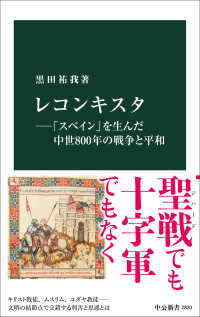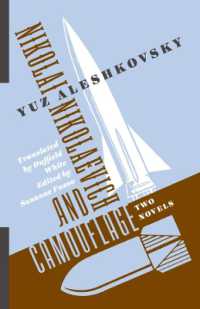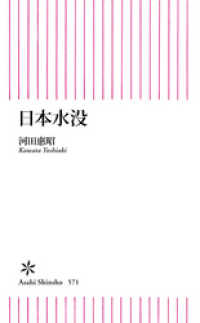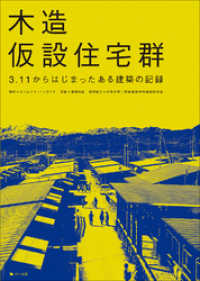- ホーム
- > 洋書
- > 英文書
- > Religion / Ethics
Full Description
An Archaeology of Disbelief traces the origin of secular philosophy to pre-Socratic Greek philosophers who proposed a physical universe without supernatural intervention. Some mentioned the Homeric gods, but others did not. Atomists and Sophists identified themselves as agnostics if not outright atheists, and in reaction Plato featured transcendent spiritual authority. However, Aristotle offered a physical cosmology justified by evidence from a variety of scientific fields. He also revisited many pre-Socratic assumptions by proposing that existence consists of mass in motion without temporal or spatial boundaries. In many ways his analysis anticipated Newton's concept of gravity, Darwin's concept of evolution, and Einstein's concept of relativity.
Aristotle's follower Strato invented scientific experimentation. He also inspired the pursuit of science and advocated the rejection of all beliefs unconfirmed by science. Carneades in turn distorted Aristotelian logic to ridicule the god concept, and Lucretius proposed a grand secular cosmology in his epic De Rerum Natura. In the two dialogues, Academica and De Natura Deorum, Cicero provided a useful retrospective assessment of this entire movement.
The Roman Empire and advent of Christianity effectively terminated Greek philosophy except for Platonism reinvented as stoicism. Widespread destruction of libraries eliminated most early secular texts, and the Inquisition played a major role in preventing secular inquiry. Aquinas later justified Aristotle in light of Christian doctrine, and secularism's revival was postponed until the seventeenth century's paradoxical reaction against his interpretation of Aristotle. Today it nevertheless remains possible to trace western civilization's remarkable secular achievement to its initial breakthrough in ancient Greece. The purpose of this book is accordingly to trace the origin and development of its secular thought through close examination of texts that still exist today in light of Aristotle's writings.
Contents
00-Title
01-Dedication
02-Table of Contents
03-Preface
04-Introduction
I. An Economic Explanation
II. Loss of Textual Evidence
III. Respectable Remnants
IV. Five Secularists Still Available Today
05-Chapter One: The Pre-Socratic Philosophers
I.Thales
II.Anaximander
III.Anaximenes
IV.Xenophanes
V.Pherecydes
VI.Pythagoras and the Pythagoreans
VII.Heraclitus
VIII.Parmenides
IX.Zeno of Elea
X.Melissus
XI.Empedocles
XII.Anaxagoras
XIII.Diogenes Apollonius
XIV.Leucippus
XV.Democritus
XVI.Final Considerations
06-Chapter Two: Plato and the Age of Pericles
I.Sophists
II.Protagoras
III.Socrates
IV.Plato
07-Chapter Three: Early Aristotle
I.Comparison with Plato
II.Christian Interpolations
III.Physics
IV. Metaphysics
08-Chapter Four: Late Aristotle
I.De Caelo (On the Heavens)
II.On Generation and Corruption
III.De Anima (On the Soul)
IV.Nicomachean Ethics
V.Conclusion
09-Chapter Five: The Lyceum after Aristotle
I.Theophrastus
II. Strato of Lampsacus
10-Chapter Six: The Epicureans
I. Epicurus
II.Lucretius
11-Chapter Seven: Skepticism
I. Pyrrho
II. Arcesilaus
III. Carneades
12-Chapter Eight: Cicero
I.Academica
II.On the Nature of the Gods
13-Epilogue
14-Bibliography
Index








